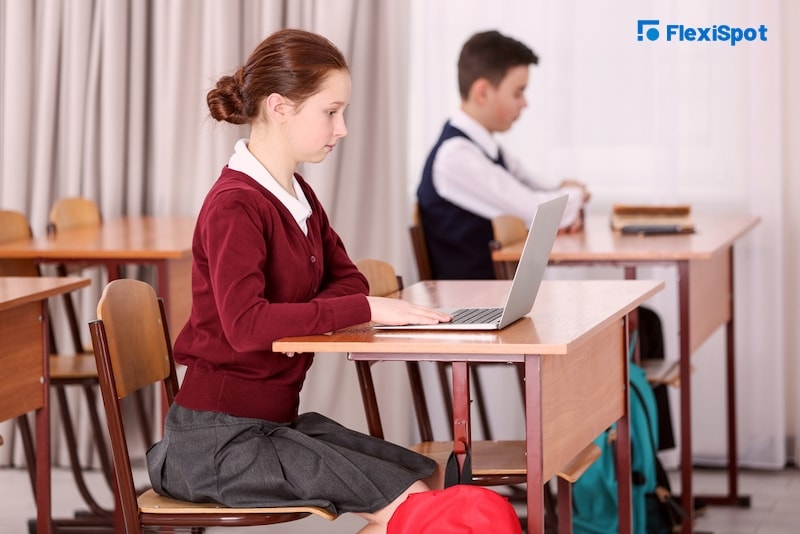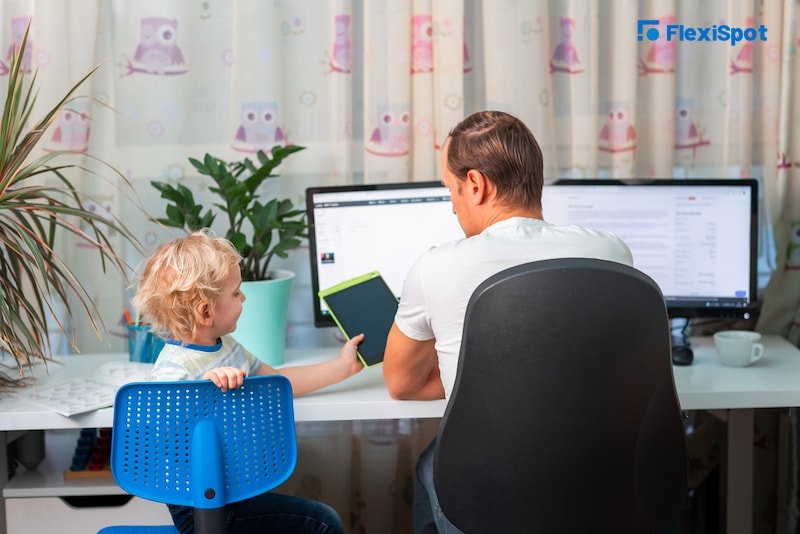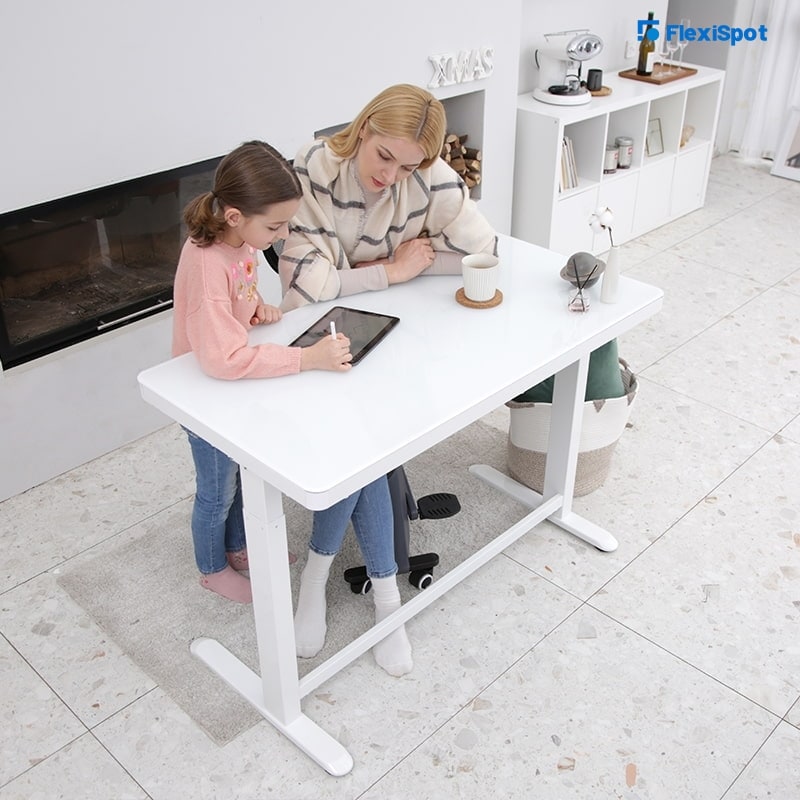When it comes to good posture, the best time to incorporate it is when one is young. Plenty of adults nowadays, working office jobs, end up with complaints about back pain, wrist pain, leg pain and all sorts of other problems due to bad posture.
Not to say that bad posture can’t be corrected, but the best way to avoid the damage it can cause is to instill the habit of keeping posture correct during childhood.
In fact, many children and teenagers nowadays also spend just as much time on their computers as adults – if not more. With the pandemic looming over our heads and many children attending school from home, it becomes even more important to address the problem of ergonomics and sitting posture for children.
Let’s consider the importance of good posture for kids and how to correct it.

Why Is Good Posture Important For Kids?
While bad posture is also bad for adults, it can actually be worse for kids. This is especially true for kids who are much younger and still growing very fast. Children’s bones are more malleable than adults’ because they haven’t yet fused together. Because their bodies are still growing, bad posture in children can result in permanent damage, especially later in life when these issues can cause greater problems.
For example, damaged spinal alignment in kids can cause kyphosis and scoliosis in adulthood, and can result in chronic pains and even lack of balance. In fact, it may also cause problems that seem otherwise unrelated, like digestive issues and heart disease.
Posture is also harder to correct as you grow older, and while not impossible, it is much more difficult to change a habit you’ve incorporated into your lifestyle than one you’re just starting to get used to. As such, it is very important for kids to maintain good posture and take care of their ergonomics.

Ergonomic and Correct Sitting Posture For Children
So, we know why good posture is important, but how do we correct this in kids? Let’s consider some good ergonomic practices for kids that they should follow for good posture.
Height of Desk & Chair
Most desks and chairs are built based on adults’ height so it is no surprise that they wouldn’t suit a child’s proportions. If they are sitting at a desk that is too high, children’s elbows and wrists can get into an unnatural and awkward position that puts pressure on both these parts. While kids will probably not be too bothered by it, the discomfort will start to settle in much later and will cause them problems throughout their adult life.
It is always important for the furniture height to be correct for the person using them. This is especially true if your child is using a computer. Because computer time would mean that children will be using the mouse or typing, they should have their arms placed in an appropriate position.
If the desk is too high, it is better to get a chair that has adjustable height to make sure that your child’s posture does not involve slouching over or keeping their arms in an unnatural position.
90-90-90 Rule
The ideal sitting posture for kids – and for adults, really – is the 90-90-90 rule. This means that your child’s elbows hips and knees should be resting at 90 degrees to each other.
To follow this, the desk they’re sitting at should be at the same level as their elbow. For the knees to be at 90 degrees, the child’s feet should be resting on the ground, or on a footrest. If your child is still young and short, their feet may end up dangling if the seat is raised to meet the desk’s height. This is also unsafe, and you should provide a footrest of sorts.

Adjustable Workstations
A solution to this problem would be to get an adjustable desk or chair. Many desks come with adjustable height, as do plenty of chairs. In fact, desks can also come with a tilt option, which helps reduce how much a child will have to hunch over the table while writing.
It also allows for better positioning of the arms and hands, and thus minimizes the strain on the shoulders and neck. If the arms are not positioned correctly, the child may face problems like shoulder pain, cervical pain and even some neuropathic problems like carpal tunnel syndrome.
Back Support
Besides the feet and arms, your child should also get adequate back support. Many chairs nowadays come with back support built in, but again, these chairs are designed for adults in mind. Your child will probably not benefit from them the same way you will.
You can use a backrest, a cushion or a rolled up towel to provide back support for your child while they sit at their desk.
Screen Height
If your child is using a screen – whether for school work or gaming, or even watching a movie – they should keep the screen at a height that is parallel to their eye level. Constantly looking up or down at the screen can cause neck pains.
When using a laptop, it is better to get peripheral mouses and keyboards so that the laptop screen can be raised. You can use a laptop stand for this, or even just a pile of books.
Regular Movement
One important thing to remember about ergonomics is that no matter how much you care about your posture, it is still not safe or healthy to stay seated for hours on end. While ergonomic postures are possible, it is actually not realistic to sit in said posture for a long time without getting restless.
In fact, even for adults, the limit is up to one hour, and for kids with more energy, this time is even shorter.
Your child can end up losing their good posture because they get tired out or bored, or lose focus in keeping the posture. As such, you should make sure that your child is not spending a very long amount of time sitting at their desk. Schedule regular breaks to make sure that your child gets to move around and refresh their brain and blood flow before they come back to their desk and adopt the ideal posture again.
Most importantly, if your child spend a long period of time sitting for school or for fun, you should also make sure that they get an adequate amount of exercise. By taking care of these things from an early age, you can make sure your child doesn’t have any health problems caused by posture as they grow up.

Comhar All-in-One Standing Desk – A Solution to the Problem
A great desk that keeps in mind all of the above is the Comhar All-in-One Standing Desk.
Height Adjustment
This desk comes with height adjustment features that allow you to shift it to whatever height you need, which is very helpful when it comes to kids, who cannot work on most desks comfortably.
Adjustable height desks also have the benefit of allowing your child to stand while working and help get rid of some of the consequences of sitting for long periods of time.
Height Presets
Besides being adjustable, it also comes with programmable height presets. This way, you can save your preferences in it and save time for whenever you want to adjust it later. Kids will probably have trouble adjusting heavy desks on their own, but that is no longer a problem with the Comhar desk, since all it takes is a press of a button.
Anti-Collision
The desk also comes with an anti-collision function which makes sure that the table is safe from damage. It also protects any other objects around it from being damaged when it’s moving.
Because it has sensors that detect when the desktop comes in contact with other objects, it stops. This way, you can get any objects lying around out of the way before resuming your height adjustment.
Floor Space
The Comhar desk also takes up minimal floor space, so you can set it up in a small corner without needing any large spaces. Kids’ rooms will usually have a lot of things in them as it is, but with the Comhar desk, you don’t have to worry about the space it takes up.
Desktop Options
The desk comes with three options for table tops. You can pick between wood, bamboo or glass, depending on what works best for your child’s room.
There is no better option that keeps your child’s ergonomics in mind than the Comhar All-in-One Desk.
By making sure your child develops good posture habits from a young age, you can be sure it will follow them through their adult life and keep them safe from all sorts of health problems associated with posture.